CIT-115: Introduction to Information Technology
Course Syllabus: Spring 2019 | Instructor: Eric Darsow
Community College of Allegheny County
Course Info
| Category | Content |
|---|---|
| Registration Classification |
Number and Title: CIT 115 - Introduction to Information Technology |
| Catalog Description |
This course explores technical issues involved with computers and information technology. Topics include computer hardware and components, operating systems, file storage, networking fundamentals, digital media, database systems, and the Internet structure and organization. Students research various information technology issues using the Internet and in-class or simulated lab exercises in a personal computer environment. |
| Prerequisites | None! |
| Sections |
CCAC WEST: MW 8-9:30am | rm.s2113 | First Class: 28-JAN-19 |
| Instructor Information |
Eric Darsow |
| Course Materials |
Technologyrediscovery.net is your home for this course. We will most likely not use a BlackBoard course site since the system is a pain to use for getting basic information easily and quickly (and it's closed source software). We'll prioritize resources that are available for no charge on via the internet, all of which will be linked via our session pages linked on the course schedule. No need to buy the assigned text associated with this course since it's not very useful for most students. If there is important content from the text, your instructor will post a reference to it or summarize it within our course documents. |
| Required Materials |
Please have access to a computer running an operating system and these basic office productivity application types:
|
Learning Outcomes
The following content is extracted directly from the CCAC master course syllabus for CIT 115:
- Identify major motherboard components, characteristics of CPUs, and various types of memory.
- Describe the types of expansion slots and adapter cards, the role of buses in a computer’s processing speed, and the differences among various input/output ports.
- Explain the characteristics of various input devices (pointing devices, digital cameras, scanners, biometric devices) and output devices (monitors, printers, speakers).
- Explain the characteristics of various storage devices (magnetic disks, optical disks, removable media, solid state).
- Describe the functions of an operating system, how they control a network, how they administer security, various utilities, and the features of desktop and server operating systems.
- Describe the structure of the Internet, how to access and connect to the Internet, the components of a URL and IP address, types of e-commerce, and how various services work.
- Describe various network communications standards, communication media, communication devices, and network architectures (client/server, peer-to-peer).
- Describe the advantages of a database approach and their various characteristics (relational, object-oriented, multi-dimensional).
- Identify the uses of various programming languages and development tools.
- Discuss the computer hardware needs and solutions for an enterprise, the importance of computer backup, and steps involved with a disaster recovery plan.
- Describe types of malware, techniques to prevent unauthorized access, methods of encryption, and risks and safeguards associated with wireless communications.
Course Philosophy
As a 100-level introductory course, this class is structured to provide students with exposure to a variety of core concepts relating to computer information technology today. The fun part about this process emerges from the clever and intriguing nature of how computers actually work as systems to accomplish very complicated tasks--both computationally (crunching numbers) and coordinationally (connecting computers through the internet).
As an overview course, we will not dive into any one topic, nor will students be expected to memorize and repeat back facts or ideas related to individual subject areas. Rather, we'll work to understand the interaction between parts and find elements of the systems that are of interest to each of us and explore those through mini projects.
Attention will be directed at the fundamentals of information technology so as to provide students with a foundation for further study in the field of computer technology. I hope that students can find an area that they are particularly interested in and focus their energies at developing a more in-depth understanding of this topic.
Course Norms
We can consider our class like a mini-community of folks who are working on a project together, in this case, we're learning about computer fundamentals. I've done some thinking about how we can work together and stay happy while doing so, and propose the following group norms which hopefully can become shared values by class members. To avoid blobs of text, I've made little cards describing the norms so we can discuss them in class.
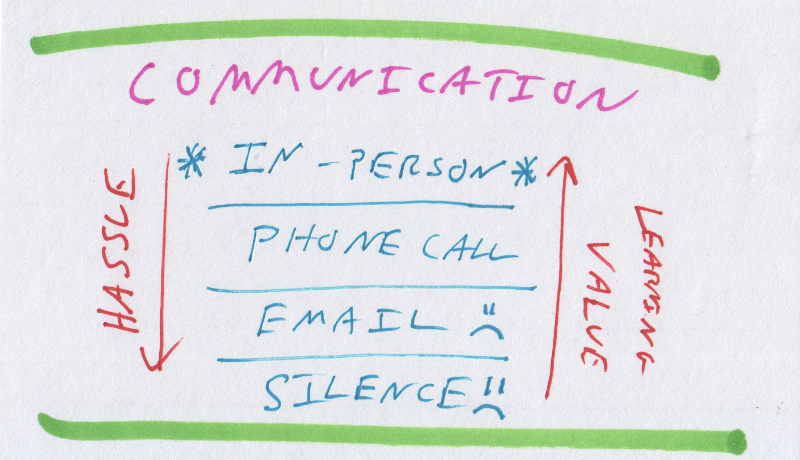
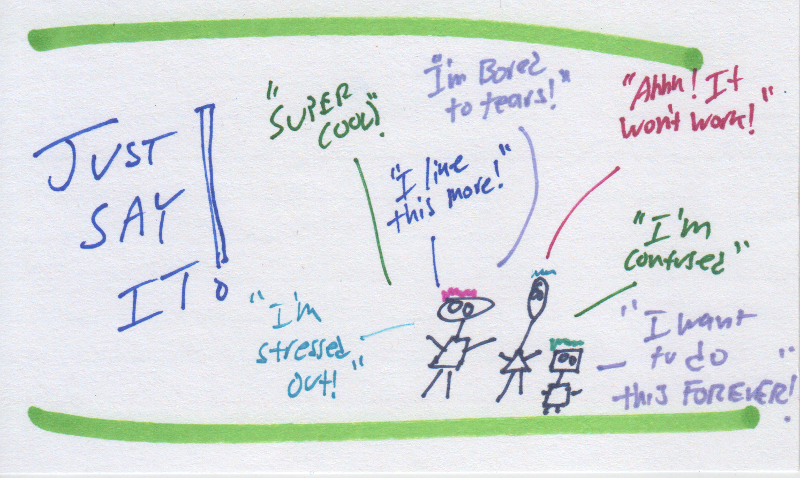
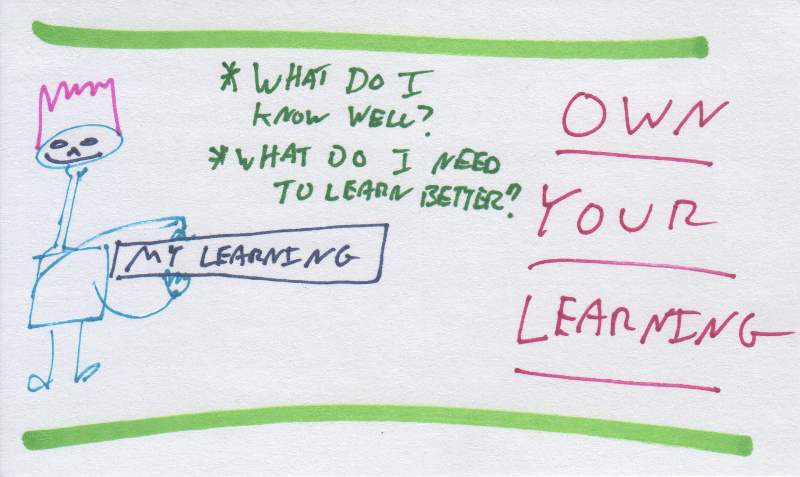
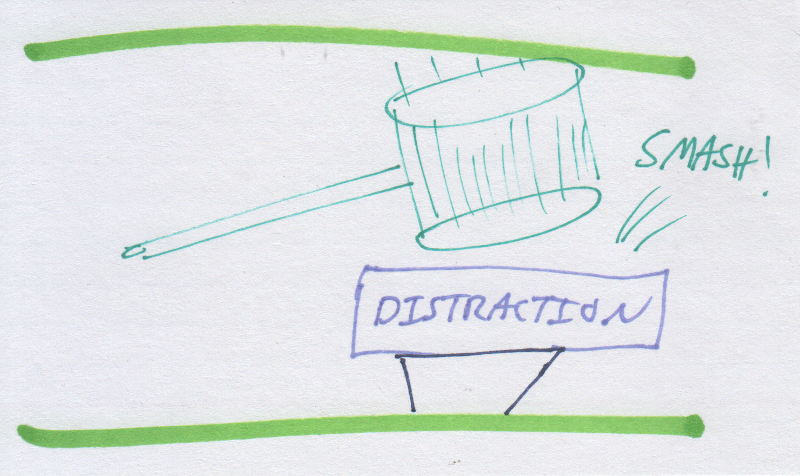
Practice / "Homework" structure
As an introductory and overview course, our most important time together will be during class sessions. (If we can't make some solid learning happen with the three or four hours per week we spend with each other, then we're not doing very well!) Given this, most lessons will not require work outside of class. You are, however, encouraged to apply this learning to interesting projects or ideas you have going on in the rest of your life and bring those ideas in to share with the class.
"Late work"
The order in which we learn stuff certainly matters a lot, but exactly when a particular chunk of learning happens doesn’t impact the quality of that learning. With this principle in mind, I accept all assigned work up until the day before CCAC’s college-wide grade submission deadlines (for mid-term and final).
Keeping pace with the class, however, is likely to be very important to your learning process. For example, what we learn in chunk 4 is an extension of what we we’ll study in chunk 3. If you have put off doing out-of-class practice, you won’t be comfortable with chunk 3 stuff and you’ll likely be confused by the new content, and this is do doubt frustrating for everybody involved. So do yourself a favor, and, when possible, schedule out regular time to practice our class skills and work through exercises.
Missing class sessions
Come to class! We want you to be part of the group! I’m here to help you learn stuff, so communicating with me about your class attendance is important so I can help keep you on track with the course.
If you miss class, please find some time in your life to work through whatever exercises have been posted for the day you were absent. Make note on what you would like more support to learn. Then come to office hours (posted on our course website) and ask questions or work through stuff that you couldn’t figure out.
If you miss class and I don’t hear from you, I’ll likely drop you an email and check in to see how you’re doing. If you’ve missed 2 class sessions and I haven’t heard from you via email or phone, I’ll probably call you to check in, so best to save my contact numbers in your phone.
Core Habits for Meaningful Learning:
- Deliberately practice developing your skills independently and/or in groups – outside of class – a few times a week. Practice distraction free: silence phones, use music sparingly, and work somewhere you can focus.
- Think of computer tools as instruments that can create their version of “music.” Treat them as such and learn your instrument’s ins and outs. Learn how it works on the inside as much as you can—even if it doesn’t seem immediately relevant. It will pay off big time in the future when you have to get it to do new things.
- Monitor for yourself what you don’t yet understand or can’t yet do and systematically exert effort to understand that stuff or do those things.
- Tinker with your tools, and break stuff (code, applications, operating systems, networks) and figure out how to fix it. This is the advantage to learning computers—breaking them doesn’t cost anything like it does in, say, woodworking, where messing up means wasting wood.
- Honor important waypoints in your learning process. (“When it really counts, make it happen.”) by being fully prepared for checkpoints and work sharing events presentations, etc.
- Make explicit note of any learning aids you use (“cite your sources”) during any work you do in this course. Include links to code you heavily reference and make happy note of major breakthroughs you made on your own.
Assessment of Learning Progress
High-stakes tests, exams, quizzes that make and break grades have generally given the notion of assessment in education a bad flavor in many folks' mouths. We shall, in this course, attempt to take back assessment as a useful tool for figuring out what we know, and what we have yet to learn, and aligning the course to make that happen. Here are some cards describing some assessment mechanisms we'll use in this course:
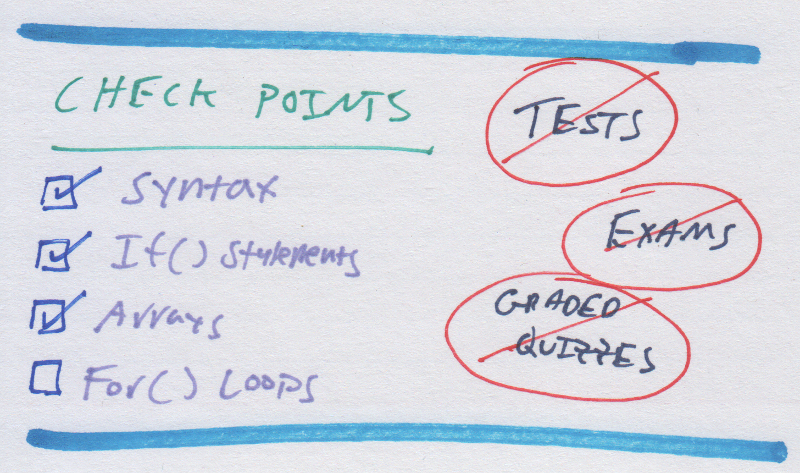
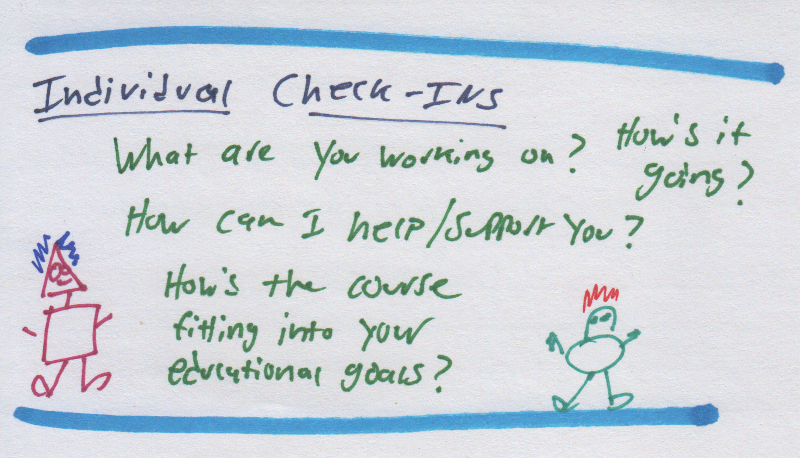
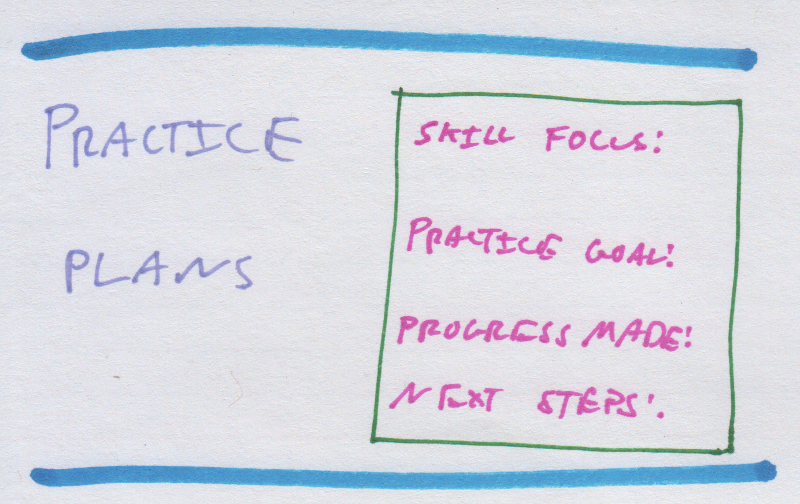

Checkpoints (not tests!):
This course will not involve tests that are high pressure, completed entirely independently, and heavily weighted. Rather, the course is designed to encourage and support regular practice which leads to incremental learning. Many courses that heavily weight tests end up encouraging students to cram in content learning directly before each major exam, and this often detracts from the regular practice that is likely much more important to becoming a proficient computer user.
In this spirit, we will have a few checkpoint tasks that are completed during class and involve completing a mini programming project that you have not previously seen. The goal of the checkpoints is to practice your evolving skills and to communicate with me about your learning progress so I can support you as much as possible in meeting your educational goals. They should be prepared for using the preparation guides on the course website, but they are not designed to be stressful or “make or break” in quality. They are literally a checking in about your progress through learning Java. Nothing more, nothing less.
The mini-project for the checkpoints should take approximately 2 hours to complete (the entire class session) and will demand that you apply all of the core concepts learned in the course up to that checkpoint time. (Languages are by definition cumulative, so what we learn during the second class period, for example, will be required for all future classes and checkpoints).
During the checkpoint, you will be encouraged to use any and all programming resources that you find helpful, including the Java API documentation and community forums like StackExchange. Of course, your use of these resources must be cited appropriately in your code—through comments—just as you should always do, forever and ever, throughout your programming journey.
I will be around to provide guidance during the checkpoints, but will be mindful of creating an experience that checks your learning so far, not mine. So I may not answer questions with the same degree of explanation as I might during a normal class session.
You will receive written or verbal feedback on your checkpoint program within a week of its completion.
Course Letter Grades
Core assessment principle: The most important outcomes of the course is the degree to which students are comfortable implementing their new skills and knowledge in “real world” situations (i.e. to solve meaningful problems)
To this end, this course will align to the Technology Rediscovery point-free grading system described in excrutiating detail here.
Suggestions for successful technical learning
We are working to learn how to use a computers—really fancy adding machines—to help us do stuff that’s useful like organize, store, and present data. Since computers are very complicated, successful learning should adapt to this environment. The following principles can be thought of as suggestions for building your computer knowledge and are based on my experience learning many new technical topics from scratch over the past few years:
- Find a book, tutorial set, or other learning resource that applies to the topic you’re studying and devour it all. Avoid skipping around and switching resources once you have found one that works with your learning style. This will help maintain a steady learning path and increase the quality of your knowledge.
- Locate the technical documentation for any tools you are using and study it carefully. These materials are usually written and published by the creators of the tools themselves. Become intimately familiar with the way the documentation is structured so you can find the information you need quickly when the moment arises.
- Expect your learning to spiral upward as you learn more and more about the important topics that are connected to your study. Since topics are often interrelated and complex, expect that you’ll need to be exposed to the same topic or idea a few times before it soaks in.
- Find a mentor or friend whose a little more proficient in the system than you are—as him/her/them questions often. Soak up what they know whenever possible. Work together when possible.
- Challenge yourself by not asking for help the moment you get stuck—tinker a bit. Experiment with a solution and see if it works. Working through confusion is an incredibly meaningful step in technical learning, since once you’re doing paid work, you’re expected to know how to solve problems.
Accommodations for Individuals with Disabilities:
The college recognizes its responsibility to provide academic and nonacademic services and programs equally to individuals with and without disabilities. To this end, the college provides reasonable accommodations for qualified students and employees with documented disabilities consistent with the requirements of the Americans with Disabilities Act, sections 503 and 504 of the Rehabilitation Act and other federal, state and local laws and regulations. The college maintains an Office of Supportive Services at each campus location to receive, review and evaluate requests from students who require an accommodation with respect to their educational program. Students’ requesting reasonable accommodations due to a documented disability must first register with their campus’ Supportive Services Office and obtain an official letter identifying approved accommodations to be distributed to their faculty members.
Attendance Procedure for Pregnancy and Pregnancy Related Conditions:
In accordance with Title IX of the Education Amendments of 1972, absences due to pregnancy or related conditions, including recovery from childbirth, shall be excused for as long as the absences are determined to be medically necessary. Students will be provided with the opportunity to make up any work missed as a result of such absences, if possible. For more information or requests for accommodations, students should inform their instructor(s) and/or contact the Civil Rights Compliance Officer/Title IX Coordinator, Sumana Misra-Zets, at 412.237.4535 or smisra@ccac.edu.
Attendance Procedure for Religious Observance
The college will make reasonable efforts to accommodate students who must be absent from classes or miss scheduled exams in order to observe a religious holiday or participate in some other form of religious observance. Students shall be provided, whenever possible, reasonable opportunity to make up academic assignments missed due to such absences, unless doing so would create or impose an undue burden on other students or the College. It shall be the students’ responsibility to provide written notice via the Request for Accommodation for Religious Observances Form (accessible at https://www.ccac.edu/nondiscrimination/) to every instructor for each course in which an accommodation is being requested. For more information contact the Civil Rights Compliance Officer/Title IX Coordinator, Sumana Misra-Zets, at 412.237.4535 or smisra@ccac.edu.
Chosen First Name Procedure for Students
Many individuals use names other than their legal first name to identify themselves for a variety of personal and/or cultural reasons. The college seeks to provide an inclusive and non-discriminatory environment by making it possible for students to use a chosen first name on college records when a legal name is not required. Chosen first names may not be applicable in certain programs due to the requirements of accreditation organizations and clinical sites. For more information, please see the Student Handbook